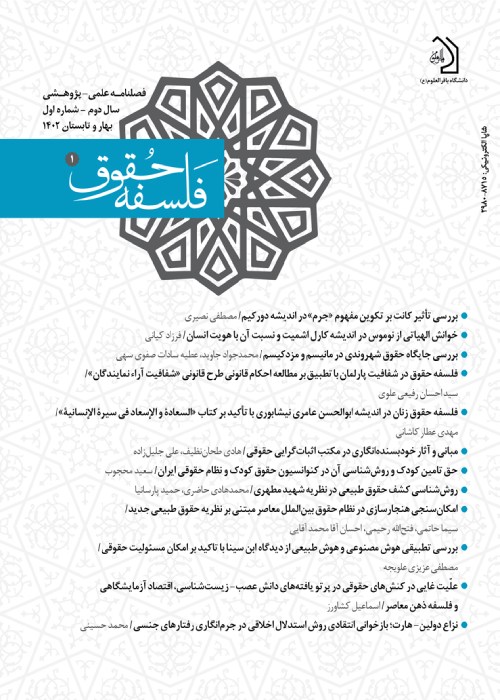A Survey on Examining the Status of Citizenship Rights in Manism and Mazdakism
Author(s):
Article Type:
Research/Original Article (بدون رتبه معتبر)
Abstract:
Manism and Mazdakism are two famous philosophical schools of thoughts in ancient Iran, which apparently have some similar teachings, and both of them were introduced against the states of their era. It is important to identify philosophical schools from various aspects, one of these aspects is the examination of citizenship rights, which provides us with the possibility of more understanding their teachings according to the requirements of today's society. In addition to identifying the various dimensions of the both aforementioned schools, the purpose of the research is to evaluate the teachings in terms of citizenship rights. Based on what mentioned, the main question of the research is to what extent citizenship rights have been identified in the schools of Manism and Mazdakism? To respond more precisely, it is necessary to examine the historical traces, books and study the teachings related to the above schools. First, to identify their philosophical foundationsfor this aim, it is necessary to find the answers in both schools through five important philosophical categories, ontology, anthropology, epistemology, methodology, and sociology, respectively, because it leads to an accurate identification and compliance of the both schools of thoughts teachings. Second, is to evaluate the teachings of these schools regarding citizenship rights, based on the philosophical responses of Manism and Mazdakism schools relating to anthropology and sociology. The most prominent approach of the current research carried out with a descriptive-analytical method, is although in the teachings of the Manism school, the ascetic and worldly prevails having led to the denial of some of the basic rights of human beings, but in religous teachings, there are clearly signs to regard civil rights such as equality between men and women. It should be highly mentioned that the denial of these rights was only related to a certain group of people who voluntarily accepted such a lifestyle. In addition to asceticism, with the aim of emerging justice and equality between people, Mazdakism proposes teachings such as the sharing of property and women. As a final result, it should be explicity mentioned that by considering the social contexts in the era of Mani and Mazdak, respect for fundamental rights of human can be seen in these two rituals, but the teachings of sharing property and women's right in the Mazdak school are considered against the rights of citizens.
Keywords:
Mani , Manism , Mazdak , Mazdakism , citizenship rights , women , Men , Philosophy of Law
Language:
Persian
Published:
Journal of Philosophy of Law, Volume:2 Issue: 1, 2024
Pages:
51 to 72
magiran.com/p2687514
دانلود و مطالعه متن این مقاله با یکی از روشهای زیر امکان پذیر است:
اشتراک شخصی
با عضویت و پرداخت آنلاین حق اشتراک یکساله به مبلغ 1,390,000ريال میتوانید 70 عنوان مطلب دانلود کنید!
اشتراک سازمانی
به کتابخانه دانشگاه یا محل کار خود پیشنهاد کنید تا اشتراک سازمانی این پایگاه را برای دسترسی نامحدود همه کاربران به متن مطالب تهیه نمایند!
توجه!
- حق عضویت دریافتی صرف حمایت از نشریات عضو و نگهداری، تکمیل و توسعه مگیران میشود.
- پرداخت حق اشتراک و دانلود مقالات اجازه بازنشر آن در سایر رسانههای چاپی و دیجیتال را به کاربر نمیدهد.
In order to view content subscription is required
Personal subscription
Subscribe magiran.com for 70 € euros via PayPal and download 70 articles during a year.
Organization subscription
Please contact us to subscribe your university or library for unlimited access!


